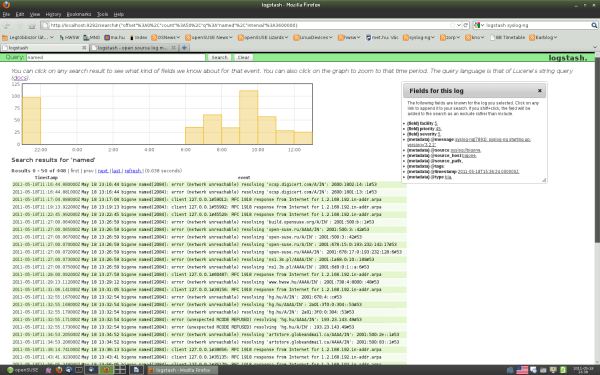Logstash is an open source tool for managing events and logs.
You can use it to collect logs, parse them, and store them for later use (like, for searching).
Logstash comes with a web interface for searching and drilling into all of your logs.
Features include:
- Three main components to a logstash agent – Input/Filters/Output
- Input:
- Files.
- stdin.
- email (cron jobs).
- syslog servers – take syslog messages over the network.
- Flume.
- Message brokers – (AMQP, STOMP, Beanstalk).
- Twitter stream API.
- HTTP, TCP socket.
- Supports wildcards.
- Filters which give structure to the logs:
- Timestamp parsing.
- Date parsing (needed because everyone invents their own time format).
- Grep (drops things that do/dont match).
- grok – compact syntax for writing a pattern matching machine.
- grok discovery – start with a sample from your logs. Grok’s discovery will try to generate a pattern that matches it.
- Drop events.
- Parse fields.
- Anonymize.
- Multiline – join related log lines in a single event.
- Output to:
- ElasticSearch – scalable indexing for logs, uses Lucene (full text search system as backend).
- Message Brokers – AMQP, STOMP, Beanstalk – take data from remote nodes and ship them over to a message system. This allows you to build a scalable message transportation by sending events from your servers and devices into a message system and have them farmed out to other logstash receivers using the same message system as an input.
- Graylog2 (GELF) – ship events to a graylog2 server.
- MongoDB – write to events to.
- Nagios – trigger Nagios alerts from events.
- WebSockets – lets you stream events in real-time to your browser.
- TCP.
- syslog.
- Chain agents together on different systems to create a networked pipeline for inputting, filtering, and outputting events.
- User interface:
- Search by field or full text.
- Graph results over time.
- See search results and page through them.
- Drill into events.
- Add your own input, output, or filter plugins to logstash.
Website: www.elastic.co/products/logstash
Support: Reference, GitHub Code Repository
Developer: Elasticsearch B.V
License: Apache 2.0

Logstash is written in Ruby and Java. Learn Ruby with our recommended free books and free tutorials. Learn Java with our recommended free books and free tutorials.
| Popular series | |
|---|---|
| The largest compilation of the best free and open source software in the universe. Each article is supplied with a legendary ratings chart helping you to make informed decisions. | |
| Hundreds of in-depth reviews offering our unbiased and expert opinion on software. We offer helpful and impartial information. | |
| The Big List of Active Linux Distros is a large compilation of actively developed Linux distributions. | |
| Replace proprietary software with open source alternatives: Google, Microsoft, Apple, Adobe, IBM, Autodesk, Oracle, Atlassian, Corel, Cisco, Intuit, SAS, Progress, Salesforce, and Citrix | |
| Awesome Free Linux Games Tools showcases a series of tools that making gaming on Linux a more pleasurable experience. This is a new series. | |
| Machine Learning explores practical applications of machine learning and deep learning from a Linux perspective. We've written reviews of more than 40 self-hosted apps. All are free and open source. | |
| New to Linux? Read our Linux for Starters series. We start right at the basics and teach you everything you need to know to get started with Linux. | |
| Alternatives to popular CLI tools showcases essential tools that are modern replacements for core Linux utilities. | |
| Essential Linux system tools focuses on small, indispensable utilities, useful for system administrators as well as regular users. | |
| Linux utilities to maximise your productivity. Small, indispensable tools, useful for anyone running a Linux machine. | |
| Surveys popular streaming services from a Linux perspective: Amazon Music Unlimited, Myuzi, Spotify, Deezer, Tidal. | |
| Saving Money with Linux looks at how you can reduce your energy bills running Linux. | |
| Home computers became commonplace in the 1980s. Emulate home computers including the Commodore 64, Amiga, Atari ST, ZX81, Amstrad CPC, and ZX Spectrum. | |
| Now and Then examines how promising open source software fared over the years. It can be a bumpy ride. | |
| Linux at Home looks at a range of home activities where Linux can play its part, making the most of our time at home, keeping active and engaged. | |
| Linux Candy reveals the lighter side of Linux. Have some fun and escape from the daily drudgery. | |
| Getting Started with Docker helps you master Docker, a set of platform as a service products that delivers software in packages called containers. | |
| Best Free Android Apps. We showcase free Android apps that are definitely worth downloading. There's a strict eligibility criteria for inclusion in this series. | |
| These best free books accelerate your learning of every programming language. Learn a new language today! | |
| These free tutorials offer the perfect tonic to our free programming books series. | |
| Linux Around The World showcases usergroups that are relevant to Linux enthusiasts. Great ways to meet up with fellow enthusiasts. | |
| Stars and Stripes is an occasional series looking at the impact of Linux in the USA. | |
